Information injection-pump assembly
ZEXEL
106873-7430
1068737430
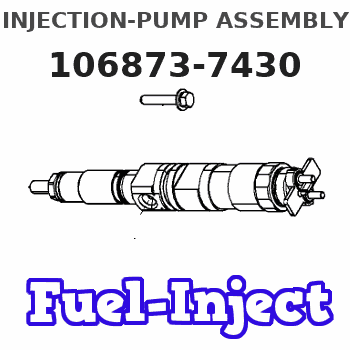
Rating:
Service parts 106873-7430 INJECTION-PUMP ASSEMBLY:
1.
_
7.
COUPLING PLATE
8.
_
9.
_
11.
Nozzle and Holder
ME093733
12.
Open Pre:MPa(Kqf/cm2)
15.7{160}/21.6{220}
14.
NOZZLE
Include in #1:
106873-7430
as INJECTION-PUMP ASSEMBLY
Cross reference number
ZEXEL
106873-7430
1068737430
Zexel num
Bosch num
Firm num
Name
106873-7430
INJECTION-PUMP ASSEMBLY
Calibration Data:
Adjustment conditions
Test oil
1404 Test oil ISO4113 or {SAEJ967d}
1404 Test oil ISO4113 or {SAEJ967d}
Test oil temperature
degC
40
40
45
Nozzle and nozzle holder
105780-8250
Bosch type code
1 688 901 101
Nozzle
105780-0120
Bosch type code
1 688 901 990
Nozzle holder
105780-2190
Opening pressure
MPa
20.7
Opening pressure
kgf/cm2
211
Injection pipe
Outer diameter - inner diameter - length (mm) mm 8-3-600
Outer diameter - inner diameter - length (mm) mm 8-3-600
Overflow valve
131425-0220
Overflow valve opening pressure
kPa
157
123
191
Overflow valve opening pressure
kgf/cm2
1.6
1.25
1.95
Tester oil delivery pressure
kPa
255
255
255
Tester oil delivery pressure
kgf/cm2
2.6
2.6
2.6
Direction of rotation (viewed from drive side)
Right R
Right R
Injection timing adjustment
Direction of rotation (viewed from drive side)
Right R
Right R
Injection order
1-2-7-3-
4-5-6-8
Pre-stroke
mm
3.9
3.85
3.95
Beginning of injection position
Governor side NO.1
Governor side NO.1
Difference between angles 1
Cyl.1-2 deg. 45 44.5 45.5
Cyl.1-2 deg. 45 44.5 45.5
Difference between angles 2
Cal 1-7 deg. 90 89.5 90.5
Cal 1-7 deg. 90 89.5 90.5
Difference between angles 3
Cal 1-3 deg. 135 134.5 135.5
Cal 1-3 deg. 135 134.5 135.5
Difference between angles 4
Cal 1-4 deg. 180 179.5 180.5
Cal 1-4 deg. 180 179.5 180.5
Difference between angles 5
Cal 1-5 deg. 225 224.5 225.5
Cal 1-5 deg. 225 224.5 225.5
Difference between angles 6
Cal 1-6 deg. 270 269.5 270.5
Cal 1-6 deg. 270 269.5 270.5
Difference between angles 7
Cal 1-8 deg. 315 314.5 315.5
Cal 1-8 deg. 315 314.5 315.5
Injection quantity adjustment
Adjusting point
-
Rack position
11.5
Pump speed
r/min
700
700
700
Each cylinder's injection qty
mm3/st.
115
111.5
118.5
Basic
*
Fixing the rack
*
Standard for adjustment of the maximum variation between cylinders
*
Injection quantity adjustment_02
Adjusting point
Z
Rack position
8+-0.5
Pump speed
r/min
430
430
430
Each cylinder's injection qty
mm3/st.
19
16.1
21.9
Fixing the rack
*
Standard for adjustment of the maximum variation between cylinders
*
Injection quantity adjustment_03
Adjusting point
A
Rack position
R1(11.5)
Pump speed
r/min
700
700
700
Average injection quantity
mm3/st.
115
114
116
Basic
*
Fixing the lever
*
Injection quantity adjustment_04
Adjusting point
B
Rack position
R1+0.9
Pump speed
r/min
1100
1100
1100
Average injection quantity
mm3/st.
117
113
121
Fixing the lever
*
Injection quantity adjustment_05
Adjusting point
C
Rack position
R1-0.6
Pump speed
r/min
500
500
500
Average injection quantity
mm3/st.
111
107
115
Fixing the lever
*
Test data Ex:
Governor adjustment
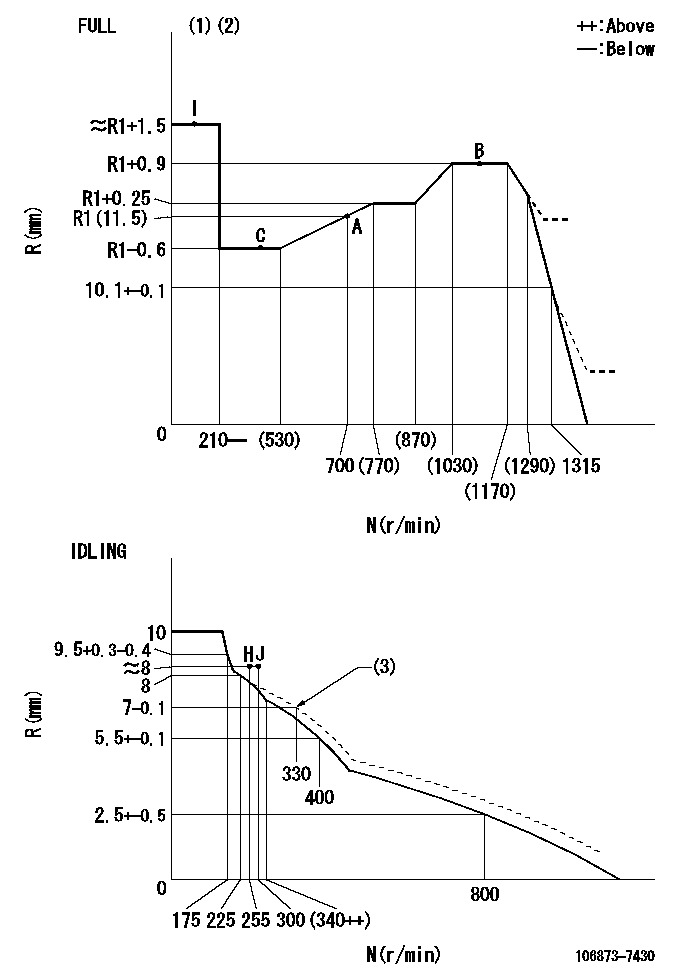
N:Pump speed
R:Rack position (mm)
(1)Torque cam stamping: T1
(2)Tolerance for racks not indicated: +-0.05mm.
(3)Damper spring setting
----------
T1=AC73
----------
----------
T1=AC73
----------
Timer adjustment
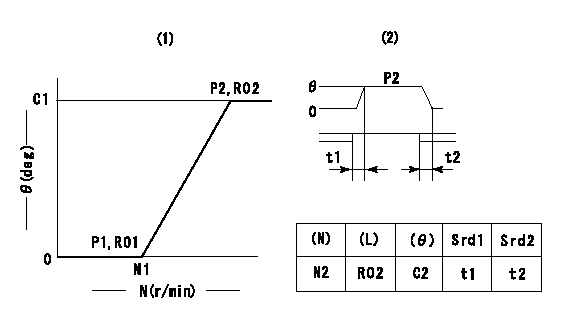
(1)Adjusting range
(2)Step response time
(N): Speed of the pump
(L): Load
(theta) Advance angle
(Srd1) Step response time 1
(Srd2) Step response time 2
1. Adjusting conditions for the variable timer
(1)Adjust the clearance between the pickup and the protrusion to L.
----------
L=1-0.2mm N2=800r/min C2=(10deg) t1=2.5--sec. t2=2.5--sec.
----------
N1=750++r/min P1=0kPa(0kgf/cm2) P2=392kPa(4kgf/cm2) C1=10+-0.3deg R01=0/4load R02=4/4load
----------
L=1-0.2mm N2=800r/min C2=(10deg) t1=2.5--sec. t2=2.5--sec.
----------
N1=750++r/min P1=0kPa(0kgf/cm2) P2=392kPa(4kgf/cm2) C1=10+-0.3deg R01=0/4load R02=4/4load
Speed control lever angle
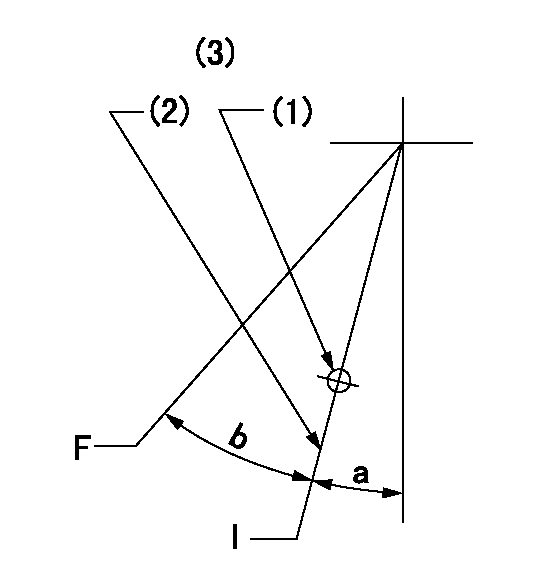
F:Full speed
I:Idle
(1)Use the hole at R = aa
(2)Stopper bolt set position 'H'
(3)Viewed from feed pump side.
----------
aa=37.5mm
----------
a=32deg+-5deg b=39deg+-3deg
----------
aa=37.5mm
----------
a=32deg+-5deg b=39deg+-3deg
Stop lever angle
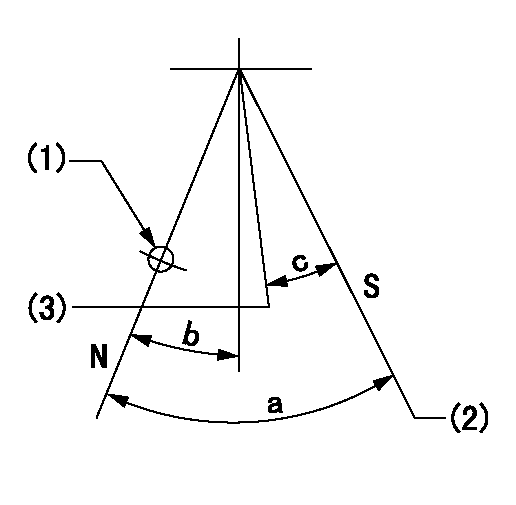
N:Pump normal
S:Stop the pump.
(1)Use the hole at R = aa
(2)Set the stopper bolt so that speed = bb and rack position = cc. (Confirm non-injection.)
(3)Normal engine position (Rack position corresponding to dd)
----------
aa=54mm bb=1100r/min cc=3+-0.3mm dd=17.5mm
----------
a=41deg+-5deg b=5.5deg+-5deg c=(31deg)
----------
aa=54mm bb=1100r/min cc=3+-0.3mm dd=17.5mm
----------
a=41deg+-5deg b=5.5deg+-5deg c=(31deg)
0000001501 RACK SENSOR
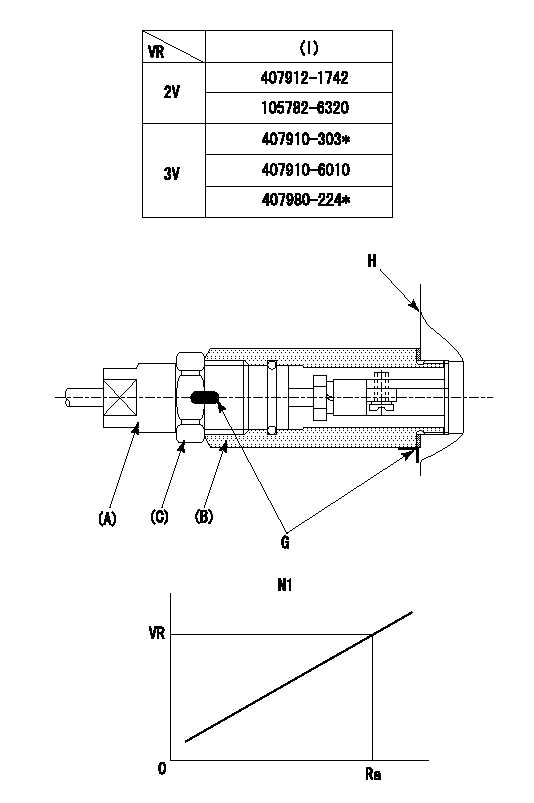
(VR) measurement voltage
(I) Part number of the control unit
(G) Apply red paint.
(H): End surface of the pump
1. Rack sensor adjustment (-0620)
(1)Fix the speed control lever at the full position
(2)Set the speed to N1 r/min.
(If the boost compensator is provided, apply boost pressure.)
(3)Adjust the bobbin (A) so that the rack sensor's output voltage is VR+-0.01.
(4)At that time, rack position must be Ra.
(5)Apply G at two places.
Connecting part between the joint (B) and the nut (F)
Connecting part between the joint (B) and the end surface of the pump (H)
----------
N1=1100r/min Ra=R1(11.5)+0.9mm
----------
----------
N1=1100r/min Ra=R1(11.5)+0.9mm
----------
Timing setting

(1)Pump vertical direction
(2)Coupling's key groove position at No 1 cylinder's beginning of injection
(3)B.T.D.C.: aa
(4)-
----------
aa=4deg
----------
a=(50deg)
----------
aa=4deg
----------
a=(50deg)
Information:
Proper operation and maintenance are key factors in obtaining the maximum life and economy of the engine. Following the directions in this manual will lower operating costs.The time needed for the engine to reach the normal mode of operation is usually less than the time taken for a walk-around-inspection of the engine.After the engine is started and the cold low idle operation is completed, the engine can be operated at rated speed and low power. The engine will reach normal operating temperature faster when operated at rated speed and low power demand than when idled at no load. Typically the engine should be up to operating temperature in a few minutes.Gauges readings should be observed and the data record frequently while the engine is operating. Comparing the data over time will help determine normal readings for each gauge, and help detect abnormal operating developments. Significant changes in the readings should be investigated.Fuel Conservation Practices
The efficiency of your engine can affect the fuel economy. Caterpillar's state-of-the-art design and manufacturing technology provides maximum fuel efficiency in all applications. Follow the recommended operating and maintenance procedures to attain optimum performance for the life of your engine.* Avoid fuel spillage. Fuel expands when warmed, and may overflow from a too-full fuel tank. Inspect fuel lines for leaks, and repair immediately.* Be aware of the heat values of different fuels. Use only recommended fuels.* Avoid unnecessary idling. Shut the engine off rather than idle for long periods of time (unless the temperature is extremely cold).* Observe the air service indicator frequently, and keep the air cleaner elements clean.* Make sure that turbochargers are operating correctly so that the proper air/fuel ratio is maintained. Clean exhaust indicated proper functioning.* Maintain a good electrical system. One bad battery cell will overwork the alternator, consuming excess power and fuel.* Make sure that belts are properly adjusted and in good condition.* Make sure that all air hose connections are tight and do not leak.* Cold engines consume excess fuel. Utilize jacket water and exhaust system heat when possible. Keep radiator fins and water pumps clean and in good repair. Never operate without thermostats. All of these items will help maintain operating temperatures.* Fuel system settings and altitude limits are stamped on the engine Information Plate. If an engine is moved to a higher altitude, settings must be changed by a Caterpillar dealer in order to prevent turbocharger damage and provide maximum engine efficiency. Engines can be operated safely at lower altitudes, but will deliver less horsepower. The fuel settings should be changed by a Caterpillar dealer to obtain the rated horsepower.
The efficiency of your engine can affect the fuel economy. Caterpillar's state-of-the-art design and manufacturing technology provides maximum fuel efficiency in all applications. Follow the recommended operating and maintenance procedures to attain optimum performance for the life of your engine.* Avoid fuel spillage. Fuel expands when warmed, and may overflow from a too-full fuel tank. Inspect fuel lines for leaks, and repair immediately.* Be aware of the heat values of different fuels. Use only recommended fuels.* Avoid unnecessary idling. Shut the engine off rather than idle for long periods of time (unless the temperature is extremely cold).* Observe the air service indicator frequently, and keep the air cleaner elements clean.* Make sure that turbochargers are operating correctly so that the proper air/fuel ratio is maintained. Clean exhaust indicated proper functioning.* Maintain a good electrical system. One bad battery cell will overwork the alternator, consuming excess power and fuel.* Make sure that belts are properly adjusted and in good condition.* Make sure that all air hose connections are tight and do not leak.* Cold engines consume excess fuel. Utilize jacket water and exhaust system heat when possible. Keep radiator fins and water pumps clean and in good repair. Never operate without thermostats. All of these items will help maintain operating temperatures.* Fuel system settings and altitude limits are stamped on the engine Information Plate. If an engine is moved to a higher altitude, settings must be changed by a Caterpillar dealer in order to prevent turbocharger damage and provide maximum engine efficiency. Engines can be operated safely at lower altitudes, but will deliver less horsepower. The fuel settings should be changed by a Caterpillar dealer to obtain the rated horsepower.
Have questions with 106873-7430?
Group cross 106873-7430 ZEXEL
Mitsubishi
106873-7430
INJECTION-PUMP ASSEMBLY